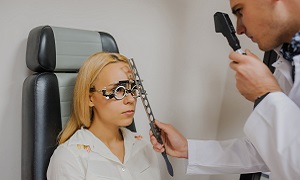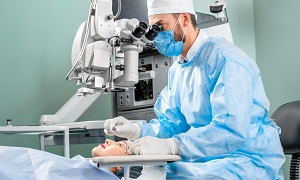Best Doctors in India for Keratoconus Treatment
Best Hospitals in India for Keratoconus Treatment
- City: Mumbai, India
Hospital Highlights:
- Fortis Hiranandani hospital was established in 2007.
- The hospital is an advanced tertiary care, multi-specialty hospital equipped with 149 beds.
- The hospital is equipped with a super ICU to provide emergency medical care to critically ill patients.
- The hospital is NABH accredited.
- The critical care facility in the hospital is augmented with the state-of-the-art facilities that facilitate speedier diagnosis and efficient monitoring.
- The hospital provides specialty medical services in cardiology, orthopedic science, pediatric science, neurology, diabetic care, urology, nephrology, ENT, obstetrics, gynecology, cosmetic surgery, bariatric surgery, neuro and spine care.
- City: Gurugram, India
Hospital Highlights:
- W Pratiksha Hospital, Gurugram, is one of the best hospitals in the NCR region. It is also a top hospital in India for IVF. Since its inception, the hospital has performed over 5500 successful IVFs. The hospital also specializes in gynecology.
- With over 20 years of experience in providing quality healthcare, the hospital is known as one of the most trusted and valued health providers in India.
- Equipped with world-class medical facilities and advanced technology, the hospital’s doctors and clinicians also have a track record of delivering excellent results. The hospital is also known for focusing on preventive well-being as much as on curative treatment.
- The hospital has earned the trust of its patients, by providing the best available treatments at affordable costs.
- City: Gurugram, India
Hospital Highlights:
- Paras hospital was established in 2006 and is the 250 bedded flagship hospital of Paras Healthcare.
- The is supported by a team of doctors of international and national repute.
- The hospital is NABH accredited and also the first hospital in the region to have a NABL accredited laboratory.
- The hospital provides specialty medical services in around 55 departments including Neurosciences, Joint Replacement, Mother & Child Care, Minimal Invasive Surgery, Gynecology and Obstetrics, Ophthalmology, Dermatology, Endocrinology, Rheumatology, Cosmetic and Plastic surgery.
- The hospital is equipped with state-of-the-art technologies.
- City: Kolkata, India
Hospital Highlights:
- Fortis Hospital, Anandapur, Kolkata is a world-class super-speciality equipped with the latest technologies in the medical world.
- The hospital is NABH accredited.
- This state-of-the-art facility specializes in cardiology and cardiac surgery, urology, nephrology, neurosciences, orthopaedics, digestive care, emergency care and critical care.
- The hospital, governed by integrated Building Management System (IBMS), has a pneumatic chute system, for quick vertical and horizontal transportation between floors, facilitating speedy transfer of patient specimens, documents, reports, and medicines to the concerned departments.
- The hospital also has a nephrology department with over 28 advanced dialysis units.
- City: Mumbai, India
Hospital Highlights:
- SL Raheja hospital is a 140-bed multi-specialty tertiary care hospital that is being managed by Fortis Healthcare Ltd.
- The hospital is a benchmark in healthcare and medical facilities in the neighborhood of Mahim & the western suburbs.
- L.Raheja Hospital, Mahim has one of the most effective ICU and Casualty care services.
- The hospital provides specialty medical services in Cardiology, Oncology, Neurology, Orthopedics, Mother & Child Care, and in Diabetes.
- City: Mumbai, India
Hospital Highlights:
- Wockhardt Hospitals were established in the year 1973, originally called First Hospitals and Heart Institute.
- Wockhardt Hospitals are super specialty health care networks in India, nurtured by Wockhardt Ltd, India’s 5th largest Pharmaceutical and Healthcare company.
- Wockhardt Hospitals is associated with Partners Harvard Medical International, an international arm of Harvard Medical School, USA.
- Wockhardt Heart Hospital performed India’s first endoscopic heart surgery.
- The hospital has a state-of-the-art infrastructure equipped with the latest technologies and modern equipment.
- It has special Centers of Excellence dedicated to the major specialties to provide hassle-free and high-quality clinical care.
- City: Gurugram, India
Hospital Highlights:
- The CK Birla Hospital in Gurugram is a NABH-accredited multi-specialty hospital.
- The hospital strives to increase the quality of healthcare by focusing on UK NHS nurse and midwife training requirements. Policies and practices derived from the National Institute for Health and Treatment Excellence (NICE) recommendations in the United Kingdom ensuring that a strong focus on safety, high-quality clinical care, and sanitation is maintained.
- The hospital’s cutting-edge technology and facilities allow for real-time communication and seamless collaboration among caregivers, ensuring accuracy and the best possible results. Those with foreign experience and accreditations make up part of the hospital’s team of clinicians.
- City: Ahmedabad
Hospital Highlights:
- As a member of the Apollo Hospitals Group, Apollo Hospitals International Limited, Ahmedabad is one of the most popular and sought-after medical facilities in Gujarat.
- Through its 6 Centres of Excellence and various affiliated branches, which cover all specialties and subspecialties, the hospital provides the most advanced clinical services.
- Since its inception in 2003, the hospital has been providing each patient with the most up-to-date medical equipment and state-of-the-art technology.
- With more than 150 successful organ transplants, including liver and renal transplants, the facility has been able to build a strong and extensive organ transplant program.
- In addition to performing 600 surgeries and caring for over 1800 patients on an IP basis, the hospital sees more than 18,000 patients on average in the outpatient department.
- With one of the biggest cardiology teams in the area, the hospital provides state-of-the-art regional care treatment in Cardiac Sciences.
- Additionally, the hospital offers a broad range of Neuro Interventional techniques to help stroke patients recover more quickly.
- City: Noida, India
Hospital Highlights:
- Jaypee Hospital is the flagship hospital of the Jaypee Group.
- This hospital has commissioned 525 beds in the first phase and has been planned and designed as a 1200 bedded multi-specialty facility.
- It holds the accreditation of the NABH and NABL.
- The hospital has state-of-the-art infrastructure equipped with the latest technologies and modern equipment like 64 Slice PET CT, Dual Head 6 Slice SPECT CT, Gamma Camera, and Da Vinci Robotic Surgery for comprehensive robotic surgical solutions.
- It has special Centers dedicated to the major specialties to provide hassle-free and high-quality clinical care.
- City: Mumbai, India
Hospital Highlights:
- Reliance Hospital is one of the best super-specialty care hospitals in Navi Mumbai.
- The main purpose of this hospital is to become a trustworthy place for the best health and hope for society. The hospital is well connected to the suburbs of Mumbai and Navi Mumbai.
- The hospital has various specialty departments, viz., Accident & Emergency, Anesthesiology, Dental Services, Dermatology, Diabetology, Dietetics Nutrition, Endocrinology, ENT, Gastroenterology, General Surgery, Gynaecology And Obstetrics, Hepato Pancreato Biliary Surgery, Infectious Disease, Internal Medicine, Interventional Radiology, Laboratory Medicine, Minimal Access Laparoscopic Surgery, Nephrology, Neurosciences, Opthalmology, Orthopaedics, Paediatrics, Pain Management Palliative Care, Physical Medicine Rehabilitation, Plastic And Reconstructive Surgery, Psychiatry, Pulmonary Medicine, Radiology, Rheumatology, Transplant, Urology Andrology, Vascular Surgery
Keratoconus
Keratoconus is a condition which occurs when your cornea, the clear, dome-shaped front surface of your eyes; thins gradually and starts bulging outward into a cone shape. The tiny fibers of protein in your eye which is known as collagen help in holding your cornea in place. When these fibers are weakened, they are unable to hold their shape. The cornea, therefore, gets more and more cone-like. The condition is caused when you don’t have enough protective antioxidants in the cornea.
In the early stages of this condition, you can use glasses or soft contact lenses. But if your condition becomes advanced, you might need a cornea transplant.
Symptoms
Signs and symptoms of this condition can change as the condition progresses. They include the following:
- Blurred or distorted vision
- Increased sensitivity to bright light and glare, and this can lead to problems with driving at night
- Needing to change eyeglass prescriptions frequently
- Sudden worsening or clouding of vision
See your eye doctor or ophthalmologist, if you feel your eyesight is worsening rapidly. Your doctor will conduct a routine eye exam, and he/she will look for signs of keratoconus.
Causes & risk factors
What exactly causes this condition is unknown, though genetic and environmental factors are generally considered to be involved. Around 1 in 10 people also have a parent with this condition.
These factors can also increase your chances of developing this condition:
- Rubbing your eyes vigorously
- Having a family history of keratoconus
- Having certain conditions, which can include Down syndrome, retinitis pigmentosa, Ehlers-Danlos syndrome, hay fever and asthma
Diagnosis
For the diagnosis of keratoconus, your ophthalmologist will review your medical and family history after which he/she will conduct an eye exam. He/she might conduct other tests to determine more details regarding the shape of your cornea. Tests to diagnose keratoconus include:
Eye refraction
In this method, your eye doctor makes the use of special equipment that measures your eyes and checks for any vision problems. He/ she may ask you to look through a device containing wheels of different lenses to help judge which combination is able to give you the sharpest vision. Some doctors might also use a hand-held instrument in order to evaluate your eyes.
Keratometry
This test involves your doctor focusing a circle of light on the cornea and measuring the reflection in order to determine the basic shape of your cornea.
Slit-lamp examination
This test involves your doctor directing a vertical beam of light on the surface of your eye. Next, she will use a low-powered microscope to view your eye. He/she will evaluate the shape of your cornea and looks for other potential problems in your eye.
Computerized corneal mapping
Special photographic tests, including corneal tomography and corneal topography, can be used to record images to create a detailed shape map of your cornea. Corneal tomography can also be used to measure the thickness of your cornea. Corneal tomography can often detect early signs of keratoconus before this disease is visible by slit-lamp examination.
Treatment
In most cases, you will probably receive new glasses, especially if your case is mild. If mild eyeglasses don’t clear things up for you, your doctor might suggest contact lenses. Over time, other treatments will also be required to strengthen your cornea and improve your eyesight.
A treatment which is known as cornea collagen crosslinking might stop the condition from getting worse. Your doctor might also implant a ring known as an Intact under the cornea’s surface. This can help to flatten the shape of the cone and improve the vision.
Surgery
Penetrating keratoplasty
If you are having corneal scarring or extreme thinning, you will likely require a cornea transplant or a keratoplasty. In this procedure, doctors are going to remove a full-thickness portion of your central cornea. This is then going to be replaced with donor tissue.
Deep anterior lamellar keratoplasty (DALK)
This procedure helps to preserve the inside lining of the cornea or the endothelium. This can help one in avoiding the rejection of this critical inside lining that may occur if a full-thickness transplant is performed.












